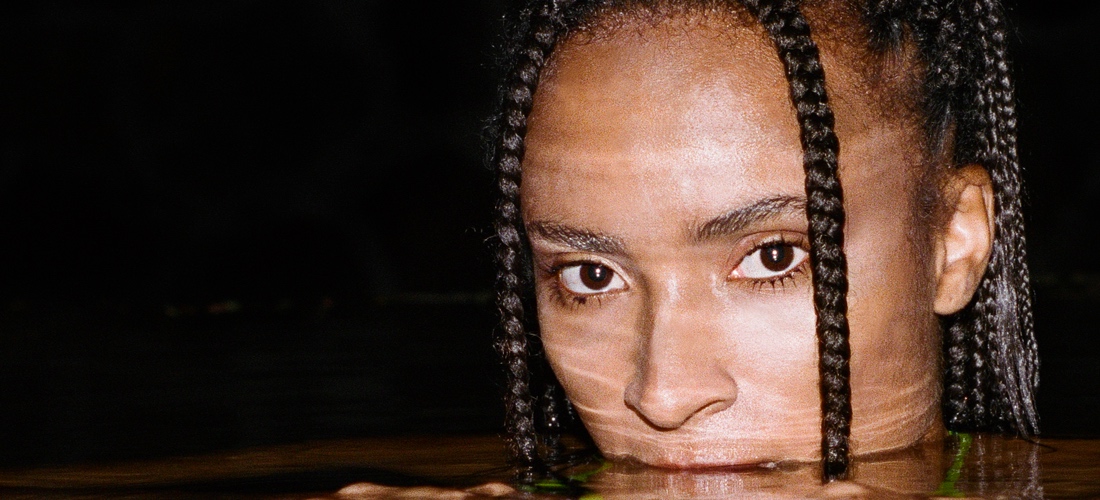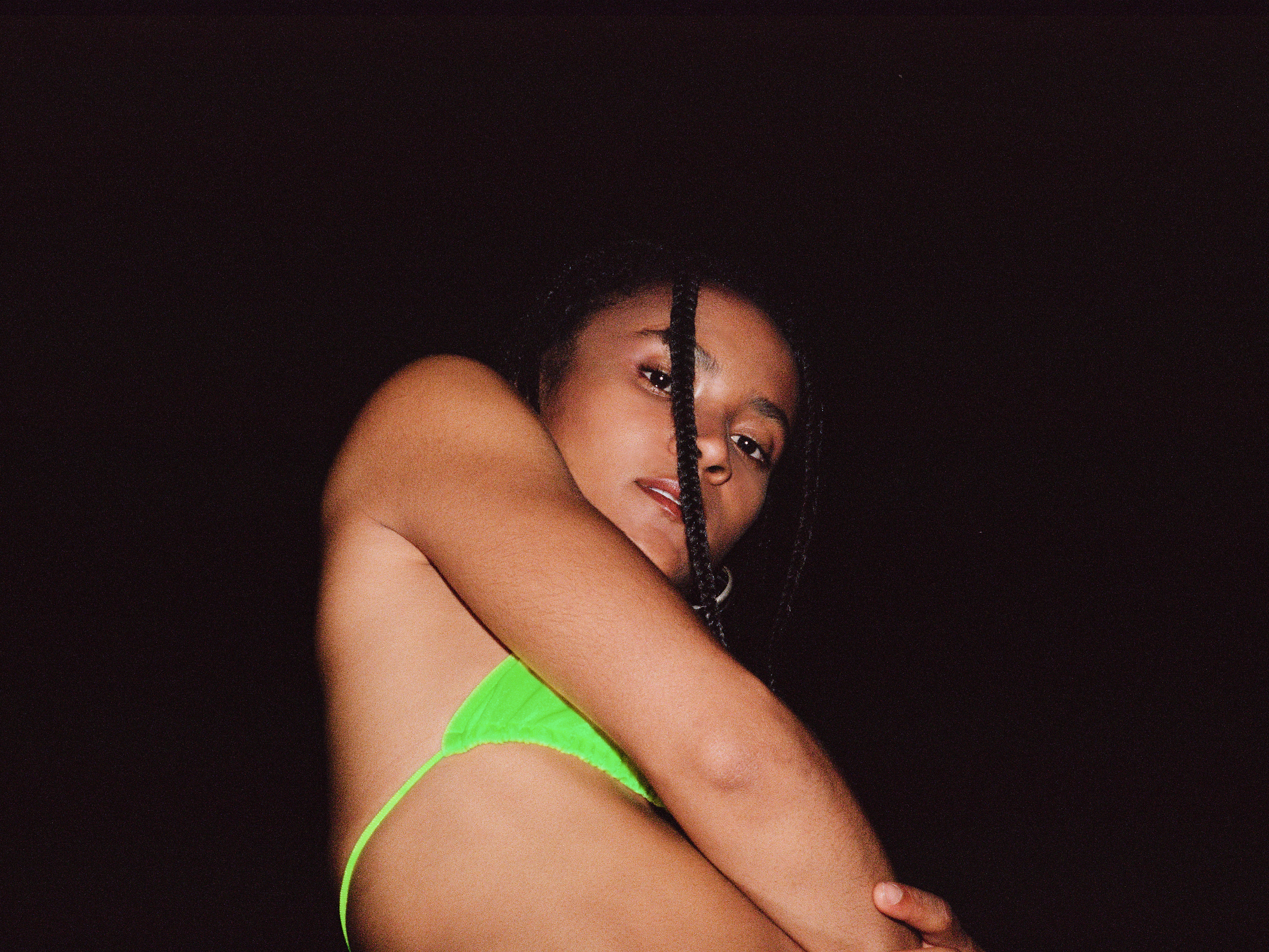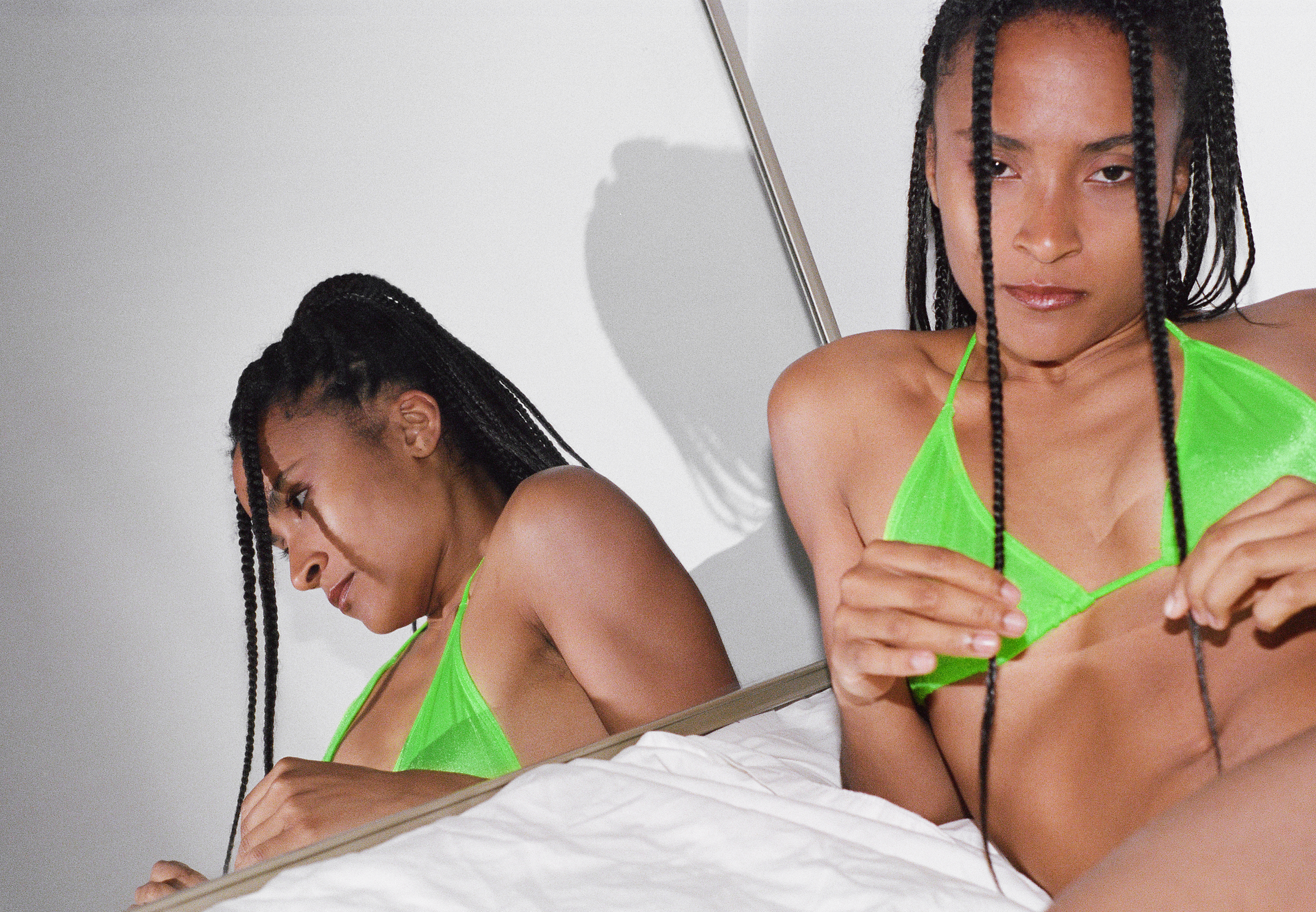20 Questions: Ouri
Get to know Ghostly's latest signing.

20 Questions: Ouri
Get to know Ghostly's latest signing.
Ourielle Auvé is Ouri, a Montreal-based DJ, electronic producer, and multi-instrumentalist hailing from South America by way of Paris, France. Her musical development began with the piano, harp, and cello, all of which “heavily influenced” her shape-shifting approach to melody and bass,” she explains. Her 2015 Maze EP is a provocative experience of vivid, entrancing dance music that preceded her 2017 Superficial album debut. Later that year, she joined forces with Montreal-based singer-songwriter Mind Bath and dropped a surprise EP that features both tenderness and aggressiveness, balancing the femininity and masculinity of the two artists. Her January 2018 live Boiler Room performance is also well worth a listen.
It wasn’t until her September Ghostly debut that Ouri really broke through. We Share Our Blood, a five-track EP, is “shaped out of mantras and hymns, ushering through the portal an offering of space for listeners to investigate their own fantasies”—and sees Ouri use her own voice for the first time. To learn more about the music and the artist behind it, we dialed in Ouri for 20 quick-fire questions.
01. Describe your surroundings right now.
I’m in my living room, surrounded with plants, biscuits, and papers.
02. What have you been up to recently?
I’ve been working on the release of my EP, preparing shows, starting a couple of new creative projects, and taking care of my loved ones.
03. What’s your idea of the perfect holiday?
The perfect holiday would be alone with my dog in a small house. No neighbors, remote from civilization. A forest and a river/lake. Either in a tropical or a Nordic environment. I don’t mind the cold as long as there’s a body of water and no human pollution (noise, gas, lights, radioactive, personal…)
04. You recently debuted on Ghostly International with We Share Blood. How did your relationship with the label come about?
Matthew from Ghostly reached out during summer ’17. We kept chatting for months. It was a tumultuous time and I had a lot of trouble just having time to create new music. But during the winter I finally unraveled and finished a project to send them. They were in. Everything was fluid from that point.
05. What is it that drew you to Ghostly as a label?
Their attitude and the other artists on the label. They are people I profoundly respect and I had absolutely all the reasons to work with them. Their support is authentic and rare; they are honest, serious, and do not rush anything. I want to give my best self.
06. It was the first EP on which you’ve used your own voice. How do you feel this changes the aesthetic of your work?
I think it doesn’t change the aesthetic of my work; but it changes the experience of creation (and I hope listening, too) to something straight-forward and direct. Music is the only medium I have for free expression; at the same time, I want to use instrumental music to convey my ideas but voice adds a lot of intimacy to the whole.

07. What inspires the lyrics that you write? Is there a story behind each song?
There is a story behind each song. I start with a very defined moment of my life experience, and I shape it. I want the moment to be felt when listening to the song. I also explore obsessions in my lyrics. I talk about power dynamics, attraction, strangeness. I am not seeking a meaning or a solution. I will never tell people what to do but rather share my take on those themes, share my perspective. Sharing experiences as we lived them is the most valuable gift in my opinion. In “We Share Our Blood,” for example, I was inspired by Audre Lorde’s very descriptive and human approach, describing basic motives to live and give life.
08. Can you give a brief background in how you first got into production? What inspired you?
I got into production because music was my most defined tool for expression since I was a kid but I didn’t quite understand percussion and electronics. I come from classical training in piano, harp, and cello, traditionally used for harmony and melody. Frustration started to develop as I was unable to convey my ideas in the style I was aiming. I downloaded Ableton, got a 49 keys Arturia keyboard with tons of presets; and my boyfriend at that time gave me a lot of drum samples and breaks and I just dived into it.
My friends were releasing their first projects, I had five songs I wanted to share. My partner really pushed me to release it, we were collaborating a lot and I needed to start my own path. I took my savings and reached out to a friend of a friend, JF Sauvé, to make my first music video, for “Surreal.” My friend Seb mixed and mastered the project. I got support from Thump for a premiere and I was so excited! Then I started using my savings for my first hardware synth, fancy VST, and a proper soundcard. I remember wanting to be anonymous at first, but this project became a way to embrace my perspective and I stop being ashamed.
Then I was studying electroacoustic music at university, learning a lot from recording to programming, taking some extra jazz harmony classes. Then I got into composition. This project was more about shaping my sound. I don’t want to restrain myself to any genre, but I needed to shape more clearly my aesthetic. It led to my second release, Superficial. My third release, We Share Our Blood, creates a direct line to the listener, establishing a clearer direction in the music and reducing the ornaments. All of this analysis came after the release, naturally.
09. You were born and raised in France. What was it like growing up there?
I was living in France until I was 16 years old. Then I moved to Montreal. Living in Paris the few years before I left, it was fascinating and very stressful. I feel like a lot of people from my generation, mixed folks, in particular, have experienced this; disconnected from part of your origins, not having a real place in society, not deserving to be recognized because identity is mixed. I was studying in music classes from the age of eight, and I felt a long time like a misfit, disconnected from the other classes. At that time I could only express myself through music (cello, harp, piano.) I was listening to music all the time, whenever I was alone, when I was on the train or walking. I was obsessed with my very cheap mp3 player and my collection of CDs and vinyl.
10. What sort of music were you listening to growing up in France? What music did you connect to?
I was listening to a lot to American and British pop music, I actually skipped most of the French repertoire because I was hanging on to MTV, the radio, and my elder brother’s hip-hop and electronic compilations. I also had a collection of jazz vinyl that I was obsessed with, but I lost them in a move.
At some point, I began listening to a lot of progressive house, techno, trance, Eurodance, minimal, dance, breakbeat, electropunk, a lot of hip-hop, pop, indie. Anything emotional and high-energy, mostly electronic and pretty much mainstream. Later, I got into underground, obscure and more sophisticated genres of music, but only when I arrived in Montreal at 16.
11. Musically speaking, do you find yourself connecting with the music of South America? What are some of your favorite South American artists?
I’m inspired a lot by South American music. I’m fusing these sounds and I’m inspired by the groove and structure. I don’t think it’s the most important feature in my music but it is definitely connected.
Deise Tigrona, Arca, NAAFI, Nicolas Jaar, Vinicius de Moraes, Mc Bin Laden, Mc Kevin, and Baden Powell de Aquino all inspire me.

12. You’re now based in Montreal. What took you to Canada, and how do you find living there?
A trip I did in Quebec when I was 12 years old. I fell in love with this land. My mom pushed me to continue my studies and life in a new country when I was 16, and Montreal was my ultimate goal. I adore this chapter of my life. I feel extremely lucky to be here. It feels like home for now.
13. You released a collaboration with Mind Bath. Can we expect more work from this project or are you focused on solo material?
There will definitely be more work. I actually just released a remix for him, for Flower Tattoo.
14. What are your three favorite records of all time, and why? What made them so special?
Jimi Hendrix Are You Experienced. It’s one of my first musical obsessions.
D’Angelo Voodoo. The interpretation and music is a pure delight. It’s bold and very elegant. I will never stop listening to this.
Travis Scott Astroworld. It’s so raw and alive and the aesthetic of this whole project is mesmerizing.
15. Which artists are inspiring you right now?
DJ J Heat; Toxe; Calibre; Tirzah; Father; XXXtentacion; MC Kevin
16. You’re beginning to tour with more frequency. How do you find life on the road?
I would love to tour for real or not at all. At the frequency I’ve experienced, I just had no structure, no stability. It’s awesome to visit new places and meet new people, but I’d love to do it for a long time and really get into it. This is just a tease and I want more or nothing.
17. How do you enjoy spending your time outside of music?
I read a lot but I need to figure out how to spend my time outside of music and reading.
18. What’s the last book you read?
The biography of Carl Gustav Jung and a correspondence between Paul-Emile Borduas (le Refus Global) and his last lover Rachel Laforest. Currently, I’m reading a book about the world global history.
19. if you could travel anywhere in the world, where would you go?
I would go to the South Pole, a long expedition, months in the cold, in the dark and wait for the first sunrise. I would go to the Salomon Islands, meet the Melanesian people and learn their music. I would go to Korea, get lost in the Amazonian forest of French Guyana, discover Sweden, Tahiti, and learn music in India.
20. Tell us something we don’t know about you.
My mom gave me birth during an ice storm, and a little piece of ice got into my eyes

